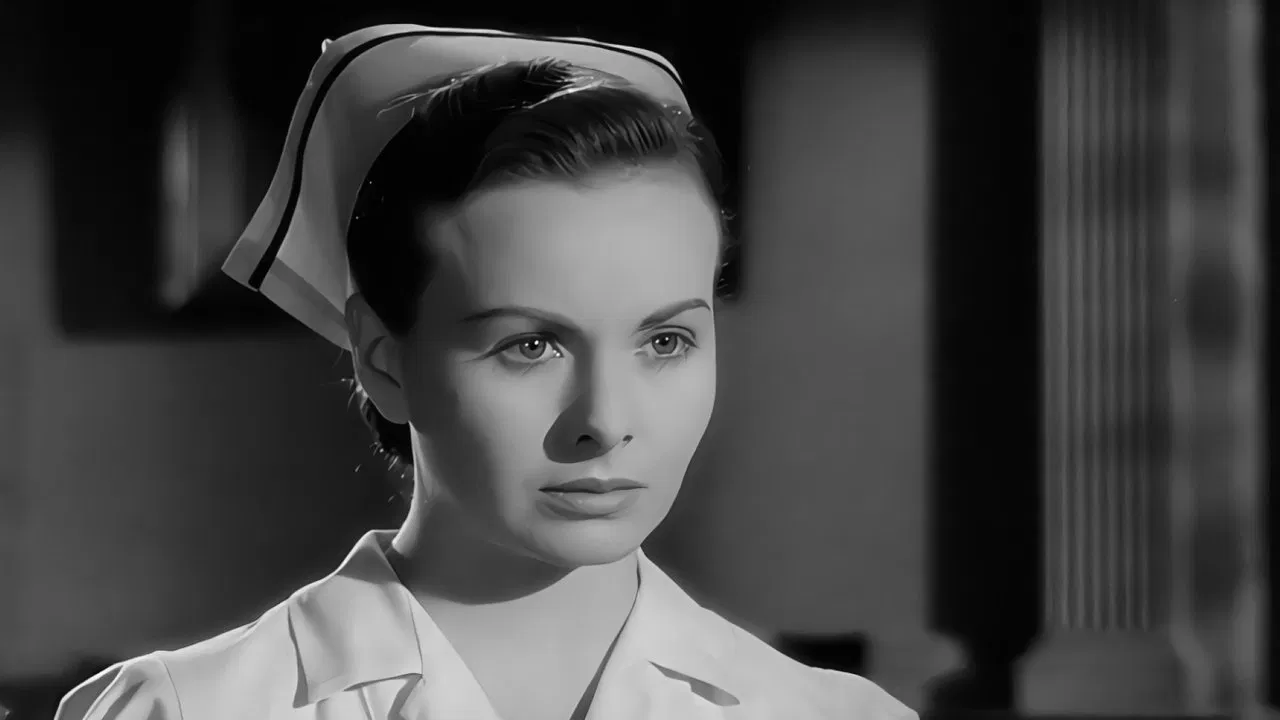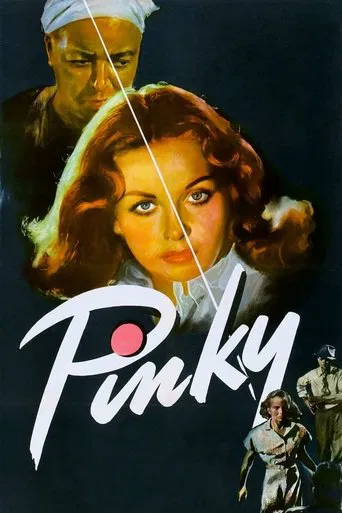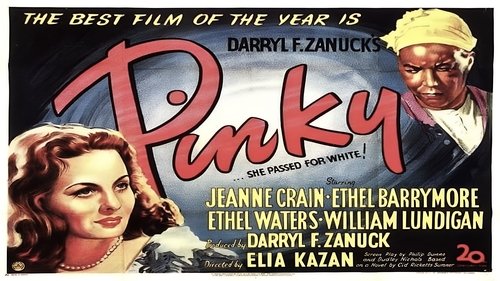


One of the reviewers (Kara Dahl Russell) on this page really shocked me : "There is a reason that "she's passing" became an understood term. Very light skinned women & men in the early part of the 1900s DID try to do what Pinky here does." No, actually she doesn't. She left her small town, and I get the feeling it was unintended on her part. She was young when Granny Dicey sent her to school, and she merely accepted what was given without understanding. She had the opportunity, but Patricia went to jail defending her heritage.I really enjoyed this movie. It is another reflection of it's time, and I was surprised at it's frankness and relativity today, especially in these times with a black president who is more racist than even the characters in this 1949 classic. I'm white, and was born in 1958 and grew up during the era of civil rights. I often was challenged by the racism of the day that was accepted and shared among my peers and society at large, but at a young age I objected to it. This movie is surprising to me now in it's treatment of white and black America even more relevant than the 'politically correct' exploitation that exists today with it's rewrite of racism's history, and foisting the guilt of America's past sins onto me.Jeanne Crain was wonderful as the light skinned 'negro' title character, which must have been very controversial in it's day for a white woman. She still gave a tremendous performance, and her race seemed unimportant. Race was a strange fruit in those days, and Hollywood was still Hollywood; a weird animal trying to please everyone, even the racism of the era.The movie easily helped to tame the animal somewhat.Ethel Waters always impresses me in everything she did, a true star, and a strong woman, but a world worn character here, but as Aunt Deedee a grounded, straightforward, woman of conviction. If Sydney Poitier earned respect as a black actor, Ethel Waters certainly paved his way.Ethel Barrymore, whose character I didn't take to at first was perfect. She was a stalwart actress who knew I'd object to Miss. Em, but she was right in her judgments, and acted on her convictions. This film really has me rooting for all the right people, and Miss Em was no exception.I was struck by the PC culture censoring the word 'colored' in this 1949 film, but allows 'negro' ( I laughed as I winced), especially when today's generation uses much more objective terminology. Elia Kazan and the script didn't rely on stereotypes here. It occurred to me while watching it, that if you removed the actors colors, it would still address the issue effectively. THIS is an important movie. I was impressed with it's transparency addressing the relationship between Pinky and her fiancée's acceptance of her heritage. Yup, put it right up there with 'To Kill A Mockingbird', 'Driving Miss Daisy','Mississippi Burning', and 'The Jackie Robinson Story'. I can't wait to see this again.
... View MoreBefore you dismiss this story as too improbable to believe, particularly with regard to the very fair Jeanne Crain, read Jillian A. Sim's article in American Heritage Magazine: "Fading to White." It is the story of her great-grandmother, Anita Hemmings, the first black woman to attend Vassar College. Only Vassar didn't know she was black, until Anita's roommate did a little digging shortly before graduation and told everyone. This created quite a scandal that got a lot of press attention. Although long forgotten today, her story may have been the inspiration for Pinky.There are some other twists to Sim's account. But one she did not know about at the time was that Anita was a descendant of President Thomas Jefferson. It is a case of truth being stranger than fiction. What if the movie ended with the discovery that Pinky was a descendant of a U.S. President? No one would believe it!Pinky deserves far more recognition today for its bold theme of racial injustice, along with the better known Gentleman's Agreement two years earlier, both produced by Darryl F. Zanuck for 20th Century-Fox. It is also a fine film, with some interesting twists to the plot.Some might criticize the negative depiction of some blacks early in the film as racist, but that's the kind of nonsense you see a lot of from oversensitive critics. Some whites in the movie are bad people, so why would you not expect that there might be some bad black people in the world, too? We see that there are very good black and white people, too, who rise above the issue of race. I see nothing particularly unrealistic or unfair about Pinky, but at the same time, one should remember this is a Hollywood movie, not a documentary.The theme of a light-skinned black woman passing for white did not originate with Pinky, but with Showboat, including the 1936 and 1951 films. Showboat's first musical incarnation was as a Broadway musical in 1927, with music by Jerome Kern and lyrics by Oscar Hammerstein II. Before that, it was a 1926 novel by Edna Ferber.One of the strengths of the Pinky is the strong sense of atmosphere and place, and some fine cinematography. In the end, it is an inspiring movie, both for the ultimate resolution of the story, and for the fact that it was made in 1949, well before the birth of the modern civil rights movement.
... View MoreJohn Ford is said to have directed part of this but, as it developed, he and Ethel Waters couldn't stand one another and Ford turned the helm over to Elia Kazan. (It doesn't look typical of the work of either man.) Basically, the eponymous character is a registered nurse who has left her job in Boston and returned to her childhood home in the African-American neighborhood of a rural Southern town. She lives with her black grandmother although Pinky herself couldn't look more "white" if she'd been Jeanne Crain or somebody.At first, as Crain wanders about the little town, folks think she's white but when it is revealed that she has a black grandmother, Ethel Waters, she's treated with the amiable disdain blacks in the rural South had to get along with in 1949.The scene in which her True Colors are revealed is emblematic. Crain visits a black man in the seedier part of the colored neighborhood. Taking note of this, a young black woman is seized with jealousy. An altercation erupts. The redneck cops arrive and break up the fight, and when the black woman says something like, "She ain't nothing but a colored gal herself," the cops slap her around. The Head Cop turns to Crain and asks with a chuckle, "It ain't true, is it?" Upon finding that it IS, the cops slap CRAIN around! It's interesting, from a sociological point of view, that Jeanne Crain, despite her severe hair style, looks and acts as white as any of the good townsfolk. It's that drop of black blood that is the criterial attribute. Genetically she may be only one sixteenth African, but she's coded as "colored" by everyone who knows about it. This is known as "the social construction of reality." She's colored not because she's mostly of African descent but because everyone agrees that she's colored. The same is true of Halle Berry (half "white") and Barack Obama (our first "black" president).Jeanne Crain as Pinky demonstrates her range as an actress, which isn't much but isn't dismissable either. She's a beautiful woman and in "Leave Her To Heaven", a few years earlier, was radiant. But there she was cheerful and self contained, and here she's sullen and pouting -- and that's about it. Ethel Waters gets the job done. Ethel Barrymore does rather more than that, and the supporting players do a professional job.One thing that struck me is that, except for a couple of incidents, race really played little part in the story. An outsider from Boston disrupts the little town and insinuates herself into the good graces (and the will) of the town's richest dying old lady. The mansion and its contacts go to the damned Yankee nurse instead of the local folks who know tradition when they see it.No one should be ashamed of his or her participation in this production. It's the product of seasoned talent, except for Elia Kazan who was just getting started. It doesn't preach. There are no Big Speeches about racism. In fact, the retired judge who sees to it that Crain gets Barrymore's mansion leaves her, saying that the outcome of the trial contesting the will, though it has gotten Crain the crumbling mansion, will bring no advantages to the community. That thought is insightful and neatly expressed.The denouement is improbable in the extreme. It's unlikely that Pinky would decide to stay in that rude community, much less turn her old mansion into a school for children. And it's frankly IMPOSSIBLE that when her white doctor boyfriend from Boston arrives, eager for marriage, she would throw him out and decide to stay with "her own kind." A NURSE -- rejecting an opportunity to marry a DOCTOR? The last shot has the camera descend on Crain's glowing face as she rings the bell for Em's School For Girls to start. A heavenly choir may be heard. She's found fulfillment. That happily sentimental shot could have come from John Ford, who sides with tradition even if nobody else does.
... View MoreRacial issues overlay this B&W film about a young Black woman who returns to her roots, only to find that little has changed among the townsfolk or in the life of her poverty-stricken grandmother. The story makes Pinky (played by Jeanne Crain) a light-skin Black. Her attitude starts out bitter and resentful, but later changes.If the story were made in modern times, the racial message would be too heavy-handed. The villains are starkly obvious. But given the 1940s, the message probably was rather daring.The plot gets off to a slow start. And Pinky is not all that sympathetic. But the plot picks up later in sync with Pinky's evolving attitudes. I think the script could have done a better job of setting the story within a specific geographic locale. I don't recall any cues or dialogue that indicates exactly where the story is set. The script is actually rather weak; the viewer can easily pick apart the story's logic.Visually, the film is something of a dud. Although the B&W lighting is good, sets look cheap and minimal. One gets the impression that the film was shot entirely on Hollywood back-lots. There's no real sense of a Southern environment.That a White woman was cast as a Black woman was a convention that apparently continued even into the 1950s. Given the era's racial attitudes, I suppose that's the only way White viewers would accept Pinky ... how dreadful. Sixty years later, the casting of Jeanne Crain as Pinky is enormously distracting; it just doesn't work. Casting Ethel Waters as the grandmother makes her character something of a stereotypical Aunt Jemima, though Waters does a fine job in the role.Overall acting is above average. I've never understood why Ethel Barrymore gets such rave recognition. In this film, she's no better than other actors, including the quite effective Evelyn Varden as a greedy, prejudiced old White woman.Probably the best that can be said of "Pinky" is that the story was ahead of its time, for the 1940s. And that's saying a lot. But sixty years later, the film seems like something from out of the Twilight Zone, with that upside-down casting.
... View More